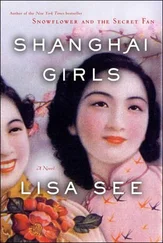Lisa See - Peony in Love
Здесь есть возможность читать онлайн «Lisa See - Peony in Love» весь текст электронной книги совершенно бесплатно (целиком полную версию без сокращений). В некоторых случаях можно слушать аудио, скачать через торрент в формате fb2 и присутствует краткое содержание. Жанр: Старинная литература, на английском языке. Описание произведения, (предисловие) а так же отзывы посетителей доступны на портале библиотеки ЛибКат.
- Название:Peony in Love
- Автор:
- Жанр:
- Год:неизвестен
- ISBN:нет данных
- Рейтинг книги:4 / 5. Голосов: 1
-
Избранное:Добавить в избранное
- Отзывы:
-
Ваша оценка:
- 80
- 1
- 2
- 3
- 4
- 5
Peony in Love: краткое содержание, описание и аннотация
Предлагаем к чтению аннотацию, описание, краткое содержание или предисловие (зависит от того, что написал сам автор книги «Peony in Love»). Если вы не нашли необходимую информацию о книге — напишите в комментариях, мы постараемся отыскать её.
Peony in Love — читать онлайн бесплатно полную книгу (весь текст) целиком
Ниже представлен текст книги, разбитый по страницам. Система сохранения места последней прочитанной страницы, позволяет с удобством читать онлайн бесплатно книгу «Peony in Love», без необходимости каждый раз заново искать на чём Вы остановились. Поставьте закладку, и сможете в любой момент перейти на страницу, на которой закончили чтение.
Интервал:
Закладка:
A few of the other wives nodded in agreement; Ze remained oblivious.
“I’d be happy to read these thoughts even without the opera,” Shen proclaimed.
Yes! This was exactly what I wanted to hear.
Then Xu Shijun snorted his skepticism. “What wife would want her name to be known outside the bedchamber? Women have no reason to get caught up in the degrading quest for fame.”
This, coming from a man who was known as an educator of women, who’d shown such sympathy for Xiaoqing’s plight, who’d been known to support the publication of women’s writings?
“No woman—let alone two wives—would want to exhibit her private thoughts in such a public way,” one of the husbands added, picking up on Xu’s surprising stance. “Women have the inner chambers for that. Liber-alism, women venturing out, men encouraging women to write and paint for profit, all these things led to the Cataclysm. We can be grateful that some women are returning to old traditions.”
I felt sick. What had happened to the loyalists? Why didn’t Li Shu and Lin Yining, both professional women writers, correct him?
“Wives need to be literate,” Shen’s tutor said, and for a moment I felt better. “They need to understand the highest principles so they can teach ( 1 8 4 )
them to their sons. But, sadly, it doesn’t always turn out that way.” He shook his head despairingly. “We let women read and then what happens?
Do they aspire to noble thoughts? No. They read plays, operas, novels, and poetry. They read for entertainment, which can only impair contemplation.”
I was paralyzed by the brutality of these words. How could things have changed so dramatically in the nine years since I died? My father may not have let me venture outside the villa and my mother may not have liked me reading The Peony Pavilion, but these ideas were far more strident than what I’d grown up with.
“Then we can agree the mystery is solved,” Shen’s tutor concluded.
“Wu Ren has accomplished something truly unique. He has opened a window for us on the meaning of and reasons for love. He is a great artist.”
“So sensitive,” one of the men said.
“ Too sensitive,” Lin Yining added, with an audible touch of bitterness.
Through it all Ze said nothing. She acted polite and sincere. She kept her eyes cast down and her hands hidden in her sleeves. No one could have accused her of being anything less than a perfect wife.
Xu Shijun took the commentary away with him and published it. He included a preface he wrote about Ren, praising him for his insights about love, marriage, and longing. And then he promoted the commentary, traveling around the country and endorsing Ren as the author of this great work. In this way, my words, thoughts, and emotions became extremely popular among members of the literati, not only in Hangzhou but across China.
Ren refused to accept any accolades.
“I did nothing,” he said. “I owe everything to my wife and the girl who would have been my wife.”
Always he got the same response: “You are too modest, Master Wu.”
Despite his denials—perhaps because of his denials—he gained a solid reputation for what Ze and I had written. Editors sought him out to publish his poems. He was invited to gatherings of the literati. He traveled for weeks at a time as his name grew. He earned money, which made his mother and wife very happy. Eventually he learned to accept the compli-ments. When men said, “No woman could ever write anything this in-sightful,” he bowed his head and said nothing. And not one of the women who’d been at Shen’s home that day came to my defense. Clearly it was easier in these changing times not to speak out or celebrate another woman’s accomplishment.
( 1 8 5 )
I should have been proud of my poet’s success. In life, I might have done exactly the same as Ze, for a wife’s duty is to bring honor to her husband in every way possible. But I was not of the living world, and I felt the anger, disappointment, and disillusionment of a woman whose voice has been taken away from her. For all my efforts, I felt Ren hadn’t heard me at all. I was crushed.
( 1 8 6 )

Jealousy-Curing Soup
a f te r th e v i s i t to sh e n ’s , z e we nt h om e and re -
tired to her bed. She refused to light the lamps. She didn’t speak. She turned down food even when it was brought to her.
She stopped dressing and pinning her hair. After the things she’d done to me, I didn’t do anything to help her. When Ren finally returned from his travels, she still didn’t get up. They performed clouds and rain, but it was as though they’d gone back to the first days of their marriage, so disinterested was she. Ren tried to coax Ze from the room with promises of pleasant strolls in the garden or a meal with friends. Instead of accepting, she wrapped her arms around herself, shook her head no, and asked, “Am I your wife or your concubine?”
He stared at her propped up in the bed, her face blotchy, her skin sal-low, her elbows and collarbones protruding from her seemingly fleshless body. “You’re my wife,” he answered. “Of course I love you.”
When she burst into tears, Ren did the only sensible thing a man could do. He sent for Doctor Zhao, who pronounced, “Your wife has had a re-lapse of her lovesickness.”
But Ze couldn’t be lovesick. She’d stopped eating, true, but she wasn’t a maiden. She wasn’t a virgin. She was an eighteen-year-old married woman.
“I’m not lovesick. I have no love in me!” Ze cried from the bed.
The two men regarded each other soberly and then looked back down at the bedridden woman.
( 1 8 7 )
“Husband, stay away from me. I’ve become an incubus, a vampire, an evil temptress. If you sleep with me, I’ll pierce your feet with an awl. I’ll suck the blood from your bones to feed the emptiness inside me.”
This was one way of getting out of doing clouds and rain, but I no longer had a desire to interfere.
“Perhaps your wife is afraid for her position,” Doctor Zhao reasoned.
“Have you been unhappy with her?”
“Be careful,” Ze warned the doctor, “or the next time you fall asleep I’ll use a piece of silk to snap your neck.”
Doctor Zhao ignored the outburst. “Does Madame Wu criticize too freely? Even an offhand remark by a mother-in-law can make a young wife anxious and unsure.”
When Ren assured the doctor this wasn’t possible, he prescribed a diet of pig’s trotters to help restore Ze’s qi.
She was not about to eat something so lowly.
Next the doctor ordered the cook to make a soup of pig’s liver to help strengthen Ze’s corresponding organ. Soon he was trying every organ of the pig to fortify his patient. None of them worked.
“You were supposed to marry someone else,” the doctor said diffi-dently to Ren. “Perhaps she’s come back to claim her rightful place.”
Ren dismissed the idea. “I don’t believe in ghosts.”
The doctor jutted his jaw and went back to listening to Ze’s pulses. He asked about her dreams, which she said were filled with vile demons and horrific sights.
“I see a woman with little flesh on her bones,” Ze recounted. “Her longing reaches out to me, wraps itself around my neck, and takes away my breath.”
“I have not been subtle enough in my diagnosis,” Doctor Zhao now admitted to Ren. “Your wife has a different kind of lovesickness from what I originally thought. She has a bad case of that most common of all feminine disorders: too much vinegar.”
This word sounded exactly the same as jealousy in our dialect.
Читать дальшеИнтервал:
Закладка:
Похожие книги на «Peony in Love»
Представляем Вашему вниманию похожие книги на «Peony in Love» списком для выбора. Мы отобрали схожую по названию и смыслу литературу в надежде предоставить читателям больше вариантов отыскать новые, интересные, ещё непрочитанные произведения.
Обсуждение, отзывы о книге «Peony in Love» и просто собственные мнения читателей. Оставьте ваши комментарии, напишите, что Вы думаете о произведении, его смысле или главных героях. Укажите что конкретно понравилось, а что нет, и почему Вы так считаете.












